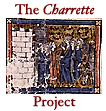
The ARTFL Project
LANCELOT: TEST
The University of Chicago
 The ARTFL Project LANCELOT: TEST The University of Chicago |
| Database Home | Bibliography | Sample Searches | Database-Specific Searching Tips | User Manual |
Database-Specific Searching Tips
Bibliographic Searching:
Author: At this time parentheses (( )) are not searchable in the
author field. Thus, block-copying a name including a parenthesis
will produce a "No documents found" message.
At this time the apostrophe in the author field is not
working properly.
Title: At this time the following punctuation marks and symbols
produce a "No documents found" message: parentheses (( )), semi-colons (;),
colons (:), ampersand (&), apostrophes ('), single and double quotes, and
brackets ([ ]) as well as the dollar sign. The following punctuation marks
have no adverse effect on a title search and, if appearing within a string,
must be entered: period (.), hyphen (-), question mark (?), exclamation
mark (!), forward slash (/), and comma (,). In all cases, spacing must match
exactly that in the bibliography.
Date: The dates in the database range from 1545 to 1864.
In all cases, "date" specifies the dates of original composition.
For the dates of publication for the editions used in data-capture,
see the Database Bibliography.
We have noticed a few data-entry idiosyncracies, and are planning to modify our data-capture procedure to minimize these problems. Please send detailed information about any problems encountered while using the database to: achou@diderot.uchicago.edu.
Please check the French Women Writers Database errata page for the most current information on problems regarding the database or its PhiloLogic implementation.